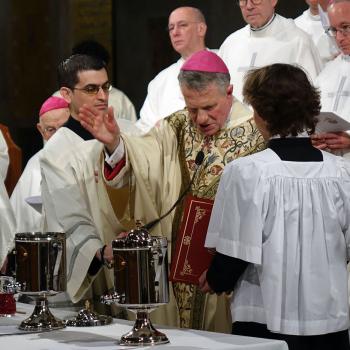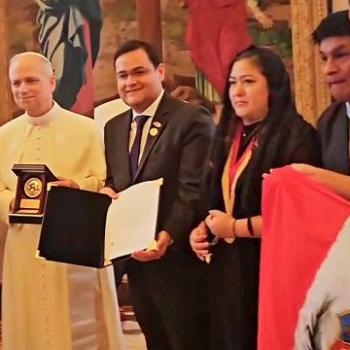The second major doctrinal factor in Mormon "universalism" also stems from Joseph Smith, the Bible, and revelation. In Smith's own words, preceding the record of the revelation itself: "it appeared self-evident... that if God rewarded every one according to the deeds done in the body, the term ‘Heaven,' ... must include more kingdoms than one. Accordingly, while translating St. John's Gospel [John 5:29], myself and Elder [Sidney] Rigdon saw the following vision."
This vision, canonized as D&C 76, made clear that the afterlife is not simply bifurcated into a Heaven and a Hell, but divided into four: three kingdoms or "degrees of glory," termed Celestial, Terrestrial, and Telestial, and one place called Outer Darkness. This last is the rough equivalent of the traditional Hell, but here's the Mormon kicker: Through Christ, virtually everyone born on earth will end up somewhere quite pleasant and non-inferno, as the glory of even the lowest kingdom "surpasses all understanding" (D&C 76:89), such that it has even generated some Mormon folklore. Hell, in the traditional sense, is reserved for the Devil, his spiritual minions, and a likely small number of humans.
The obvious question arises: If Mormon membership is not required for salvation, why do the Mormons go to such effort to bring people in to the Mormon Church? The answer lies in the differences between the three kingdoms or degrees of glory. Only in the Celestial does one fully partake of the blessings and reward God has promised, to "partake of the divine nature" (2 Pet. 1:4) and "inherit all things" (Rev 21:7.)
Now, one can divide this pie differently. One could argue that instead of three degrees or kingdoms or mansions of heaven, anything less than the highest kingdom would be hell and damnation. I don't think that point can glibly be dismissed, particularly considering the difference in Mormon theology between the blessings of the Celestial kingdom versus the other two (which will be discussed in depth in about two weeks). Comparatively, however, given a model in which the vast majority of the world is condemned to an eternity of torment versus one in which a very small number is destined for such a place, reframing the Mormon view as Heaven (=celestial kingdom) and three degrees of Hell (= other two kingdoms +outer darkness) is a distortion. Mormon theology presents an afterlife in which more people have the opportunity to hear Christ's gospel, and in which all but a very few find their own billowy corner of cloud nine.
Ben Spackman has studied Near Eastern Languages and Civilizations at the University of Chicago, focusing on philology and Semitic languages. He has taught various courses in a volunteer capacity for the LDS Church Education System since 2003 and now serves as the Patheos Mormon Portal Manager.




